
THE 70-YEAR JOURNEY OF THE GFCM
2022 marks the 70th anniversary of the General Fisheries Commission for the Mediterranean (GFCM) of FAO. It’s a significant milestone for an organization that has an important role to play in our collective future. But what does the GFCM actually do? How does it work? What has it achieved? If you’d like to know more, read on…
Who are we? The GFCM is the FAO regional fisheries management organization active in the Mediterranean and Black Sea. We’re made up of 23 contracting parties – 19 Mediterranean states, 3 Black Sea states and the European Union. An additional 6 states are cooperating non-contracting parties, who are not formally part of the Commission but who play a full part in our activities. | Why are we more effective now than ever? The GFCM has evolved from a tool for countries to discuss fishery-related issues to a Commission adopting binding recommendations for fisheries and aquaculture in the region. It is now equipped with mechanisms to collect and assess the data in the region, in order to take the most informed regional decisions, ensure compliance and develop projects of common interest. |
WHAT HAVE WE ACHIEVED TOGETHER?
Following the modernization of our institutional framework, the last decade has seen some particularly significant developments: here are 10 achievements from the last 10 years.
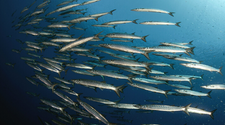
Producing the first and only comprehensive review of fishery trends in the region
The State of Mediterranean and Black Sea Fisheries (SoMFi) is the flagship biennial guide to the status of fisheries in our area of application. Compiled from the data regularly submitted by our member countries and the latest findings of the GFCM’s scientific bodies, SoMFi was first published in 2016. Since then, it has become the definitive policy guide to the main issues related to fisheries in the region, an invaluable reference resource, and a key tool to support strategic decision-making in fisheries management in our member countries. The next edition will be out later this year.
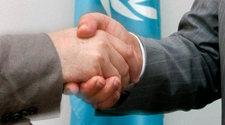
Driving momentum through political commitments, Regional Plans of Action and expert partnerships
We’ll only achieve a Blue Transformation in the Mediterranean and Black Sea through across the board cooperation. We’ve worked hard in recent years to build the profile of our fisheries and aquaculture sectors across the region, raising political awareness of their importance and winning high-level backing for our mission. This has been enshrined in a number of formal declarations; and translated into strategic and practical plans of action collectively backed by government ministers from our member countries.
- Regional Plan of Action for Small-Scale Fisheries in the Mediterranean and the Black Sea
- Regional Plan of Action for the fight against Illegal Unreported and Unregulated fishing
- Malta MedFish4Ever Ministerial Declaration
- Sofia Ministerial Declaration
- Declaration of the High-Level Conference Towards Enhanced Cooperation on Black Sea Fisheries and Aquaculture (Bucharest Declaration)
Just as essential to the success of the GFCM mandate is formal cooperation with a wide range of intergovernmental, non-governmental, academic and civil society organizations with common interests. Solid partnerships with other specialized actors vastly extend the potential of what we aim to achieve together. The continuous exchange of the latest information, best practices and new ideas is in everybody’s interests as we work towards a sustainable future.
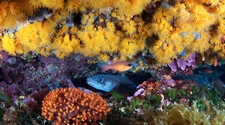
Conserving the marine environment
The Mediterranean Sea is under serious environmental strain. It’s a global hotspot for anthropogenic pressures including climate change, plastic pollution and invasive species, all of which are increasingly affecting the marine environment – and productive fisheries and aquaculture require healthy seas. Conserving the marine environment and building ecosystem resilience while ensuring sustainable seafood production has become a central priority for the GFCM over the last decade, and today it’s the first target in our 2030 strategy.
On one hand, we work on the conservation of biodiversity, using area-based conservation measures, improvements in gear technology, selectivity and many other methods to protect key stocks, reduce bycatch and preserve vulnerable species and essential habitats. We’re also working with fishers across the region and collaborating with partners to mitigate the impacts of other anthropogenic threats to fishery productivity, building fishers’ capacity and devising adaptive management plans for sustainable stocks in a changing sea.
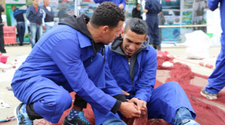
Sharing knowledge and experiences across the region
As a body which works with more than 20 countries and dozens of expert organizations, the GFCM is there for everybody with an interest in the future of our marine resources. We use our convening power to bring fishers, managers, scientists and others together across the region, sharing experiences and best practices, constantly driving progress.
We hold regular events for participants from all over the basin to discuss key issues, while our Small-Scale Fishers’ Forum brings small-scale fishers together to explore solutions to common challenges, learn new techniques and share fresh ideas. Gathering and spreading best practices and technical knowledge as widely as possible is also the rationale behind the Aquaculture Demonstration Centres we established in the Black Sea in 2019, the first institutions of their kind in the region (see below).
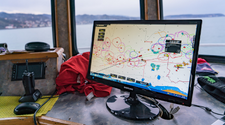
Harmonizing the collection of data – and building a framework to use it
Effective fisheries management comprises many elements, but the basis of all is data: without it, it’s impossible to make informed and evidence-based management measures. One of our key activities is to work with our member countries to gather as much information as possible on the state of their fishery resources, which GFCM subsidiary bodies use to make recommendations and support adaptive decision-making. Crucially, this activity is coordinated and harmonized through our Data Collection Reference Framework, launched in 2013, which standardizes regional production statistics and information underpinning stock assessments through a comprehensive, reliable and efficient process that feeds directly into the provision of science-based management advice.
We also maintain other important databases on behalf of our member countries: these include a searchable fleet register with information on nearly 80,000 vessels, a register of ports, lists of vessels authorized to undertake certain activities, and a list of vessels believed to have carried out illegal, unreported and unregulated (IUU) fishing in the GFCM area of application.
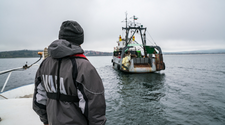
Improving compliance, enforcing regulations
The recommendations the GFCM adopts as a body are legally binding and must be transposed into national legislation by our member nations. Making sure that these regulations are correctly framed then collectively followed is an essential part of our operations. Our 2019 GFCM-Lex initiative makes an important contribution as a regional repository which provides transparent and user-friendly access to information on national legislative frameworks on marine matters. Today we take a multifaceted approach to ensuring adherence to fishery management and conservation measures, raising awareness among fishers and authorities, and collaborating with members to put in place strong surveillance and control arrangements. Our Compliance Committee monitors these activities, identifying cases of non-compliance and working to resolve them.
We’ve also been stepping up our activities in the fight against illegal, unregulated and unreported (IUU) fishing, which causes great economic damage and puts legal fisher livelihoods at risk, as well as undermining efforts to manage commercial stocks sustainably. A range of measures to combat IUU fishing – from catch documentation programmes to fleet registers, IUU vessel lists and even an IUU awards scheme – are codified in separate Roadmaps to guide our strategy in the Mediterranean and the Black Sea.
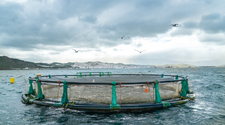
Building strong foundations for regional aquaculture development
It’s impossible to overstate the importance of the role our region’s aquaculture sector is playing in food security, employment and economic development. Production of farmed marine fish has grown by about 70% in the last decade, yielding more than 1 million tonnes each year and indirectly employing about 500 000 people. But the sector is at different stages of development around the Mediterranean and the Black Sea, and a level playing field is needed to ensure its full potential.
That’s where the GFCM comes in: our strategy for aquaculture aims to promote a sustainable sector that’s productive, profitable and globally competitive. We’re doing this by supporting responsible investment, spreading best practices, and providing stakeholders with the technology and data they need to develop their operations. With a subregional focus on the Black Sea: in 2019 we opened Aquaculture Demonstration Centres in Romania and Turkey to increase R&D capacity and provide training on key aspects of sustainable aquaculture development.
How will we work together to build on this momentum? While our 70th anniversary is a good time to look back at what we’ve achieved collectively so far, our strategic energies remain firmly focused on the future, building on the successes of the recent past. In the region and across the wider world the coming years are critical in terms of the choices we make towards the food production systems we want: if we act wisely and decisively together, we’ll achieve the sustainable outcomes on which the future of the sector depends – but time is running out. With this in mind, the GFCM’s 2030 Strategy sets out our priorities for the next decade under a series of clear targets. It’s the fruit of several years of planning and development by our members, and is rooted in practical actions geared to areas including productive fisheries, healthy seas, compliance and enforcement, sustainable aquaculture development, better livelihoods, and regional capacity-building. The 2030 Strategy also aims to increase the participation of women and young people across the sector, further aligning it with the relevant UN Sustainable Development Goals. We look forward to continue to work closely with everyone involved with the sector as we implement our ambitious Strategy for a sustainable future. |
